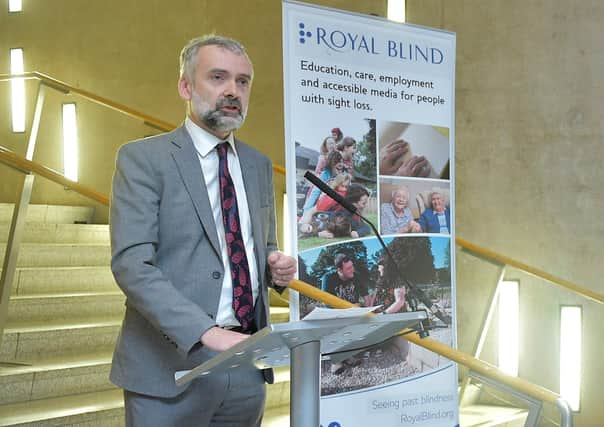Social distancing when you can’t see around you


We like to think of Scotland as a tolerant, inclusive country. In so many ways we are. Great progress has been made on important equalities issues in our society.
Nevertheless, comments like this show that we still have a long way to go. Still too often, disabled people in our communities face discrimination and even abuse.
Advertisement
Hide AdAdvertisement
Hide AdWe have recently been asking people with visual impairment who use Royal Blind and Scottish War Blinded services about their experience of lockdown. They understand that the impact of coronavirus has been hugely difficult for us all, but social distancing has undoubtedly created particular challenges for people living with sight loss.
It is difficult or impossible to observe social distancing when you can’t see what’s about you. This makes it vital that those of us who do not have sight loss understand this, and act with kindness and tolerance to support people with visual impairment and other disabled people as they cope with social distancing.
When we hear of incidents of people with visual impairment being discriminated against in our communities, this shows that we still have to do more as a society to protect their human rights.
The aftermath of the pandemic presents new challenges to the inclusion of disabled people. Social distancing has made many people with visual impairment anxious about going into their communities, using public transport and accessing public services. Lockdown had a huge impact on care services.
Finding employment will be even harder for disabled people as job losses increase when there was already a significant disability employment gap.
When the First Minister announced the Scottish Government’s Programme for Government earlier this month, there were some “big ticket” policy initiatives to respond to the pandemic. A jobs guarantee for young people and a national care service were among these. We welcome these if they include specific measures to support young disabled people into employment and recognise that our care services need not only a new structure but also to be properly funded, which they are not today.
As a visual impairment charity, we were clearly pleased to welcome further funding for community eye care services which we hope will be a step towards a new national low vision service.
While issues such as these grabbed the headlines, I believe one of the more unheralded policy announcements could be of the greatest significance for securing rights and opportunities for disabled people in the future.
Advertisement
Hide AdAdvertisement
Hide AdWe were delighted that the First Minister announced that the Scottish Government will consult on the incorporation of the UN Convention on the Rights of Disabled People into Scots Law, in the same way Ministers have announced they will take forward legislation to incorporate into our laws the UN Convention of the Rights of the Child.
If Ministers take the same action in relation to disability, it will mean that public authorities, including the Government, will be required by law to act in compliance with the convention’s requirements to recognise, respect and be accountable for the rights of disabled people.
We know this won’t solve all the problems disabled people face overnight.
There is still so much to do to ensure that in every area of life they have fair and equal chances.
What it would provide is the strongest signal from government that disabled people are valued in our society and we will protect their rights in education, employment, and care.
It commits government to acting so that people with visual impairment can go out into their communities confident they will be met not with ignorance, but kindness.
Mark O’Donnell, chief executive, Royal Blind and Scottish War Blinded.
Comments
Want to join the conversation? Please or to comment on this article.